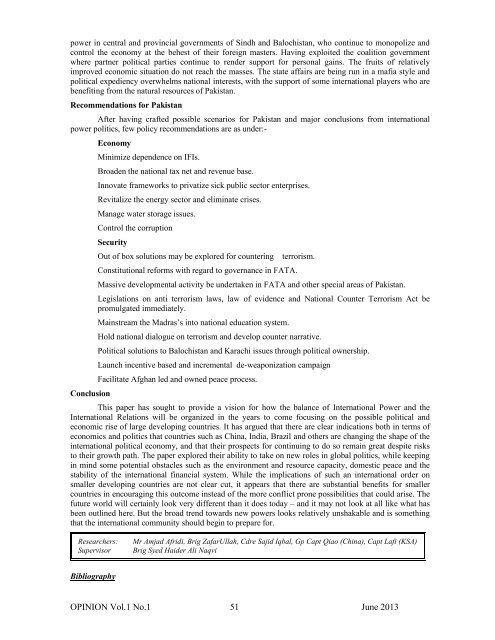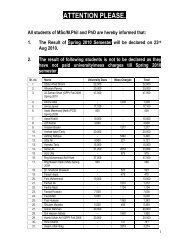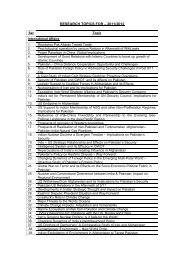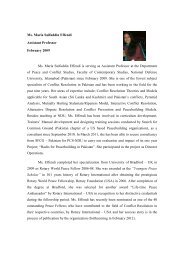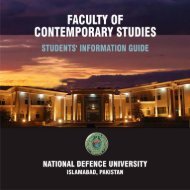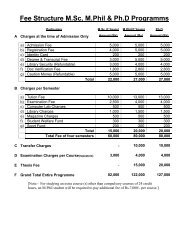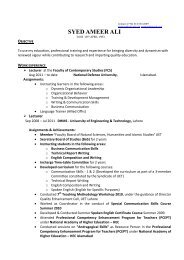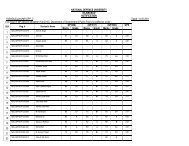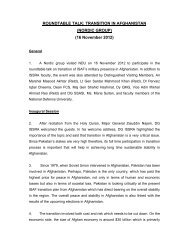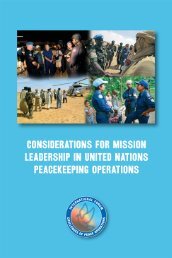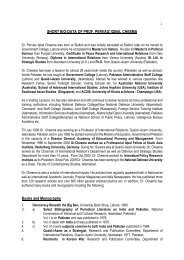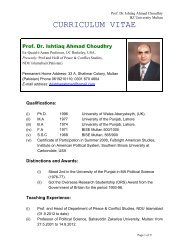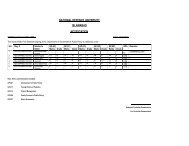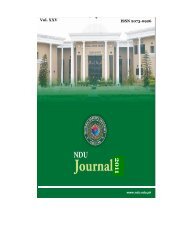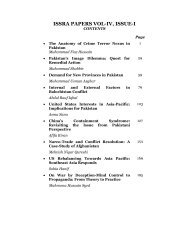OPINION Vol.1, No.1 June 2013 - National Defence University
OPINION Vol.1, No.1 June 2013 - National Defence University
OPINION Vol.1, No.1 June 2013 - National Defence University
You also want an ePaper? Increase the reach of your titles
YUMPU automatically turns print PDFs into web optimized ePapers that Google loves.
power in central and provincial governments of Sindh and Balochistan, who continue to monopolize and<br />
control the economy at the behest of their foreign masters. Having exploited the coalition government<br />
where partner political parties continue to render support for personal gains. The fruits of relatively<br />
improved economic situation do not reach the masses. The state affairs are being run in a mafia style and<br />
political expediency overwhelms national interests, with the support of some international players who are<br />
benefiting from the natural resources of Pakistan.<br />
Recommendations for Pakistan<br />
After having crafted possible scenarios for Pakistan and major conclusions from international<br />
power politics, few policy recommendations are as under:-<br />
Conclusion<br />
Economy<br />
Minimize dependence on IFIs.<br />
Broaden the national tax net and revenue base.<br />
Innovate frameworks to privatize sick public sector enterprises.<br />
Revitalize the energy sector and eliminate crises.<br />
Manage water storage issues.<br />
Control the corruption<br />
Security<br />
Out of box solutions may be explored for countering terrorism.<br />
Constitutional reforms with regard to governance in FATA.<br />
Massive developmental activity be undertaken in FATA and other special areas of Pakistan.<br />
Legislations on anti terrorism laws, law of evidence and <strong>National</strong> Counter Terrorism Act be<br />
promulgated immediately.<br />
Mainstream the Madras’s into national education system.<br />
Hold national dialogue on terrorism and develop counter narrative.<br />
Political solutions to Balochistan and Karachi issues through political ownership.<br />
Launch incentive based and incremental de-weaponization campaign<br />
Facilitate Afghan led and owned peace process.<br />
This paper has sought to provide a vision for how the balance of International Power and the<br />
International Relations will be organized in the years to come focusing on the possible political and<br />
economic rise of large developing countries. It has argued that there are clear indications both in terms of<br />
economics and politics that countries such as China, India, Brazil and others are changing the shape of the<br />
international political economy, and that their prospects for continuing to do so remain great despite risks<br />
to their growth path. The paper explored their ability to take on new roles in global politics, while keeping<br />
in mind some potential obstacles such as the environment and resource capacity, domestic peace and the<br />
stability of the international financial system. While the implications of such an international order on<br />
smaller developing countries are not clear cut, it appears that there are substantial benefits for smaller<br />
countries in encouraging this outcome instead of the more conflict prone possibilities that could arise. The<br />
future world will certainly look very different than it does today – and it may not look at all like what has<br />
been outlined here. But the broad trend towards new powers looks relatively unshakable and is something<br />
that the international community should begin to prepare for.<br />
Researchers:<br />
Supervisor<br />
Mr Amjad Afridi, Brig ZafarUllah, Cdre Sajid Iqbal, Gp Capt Qiao (China), Capt Lafi (KSA)<br />
Brig Syed Haider Ali Naqvi<br />
Bibliography<br />
<strong>OPINION</strong> <strong>Vol.1</strong> <strong>No.1</strong> 51 <strong>June</strong> <strong>2013</strong>


